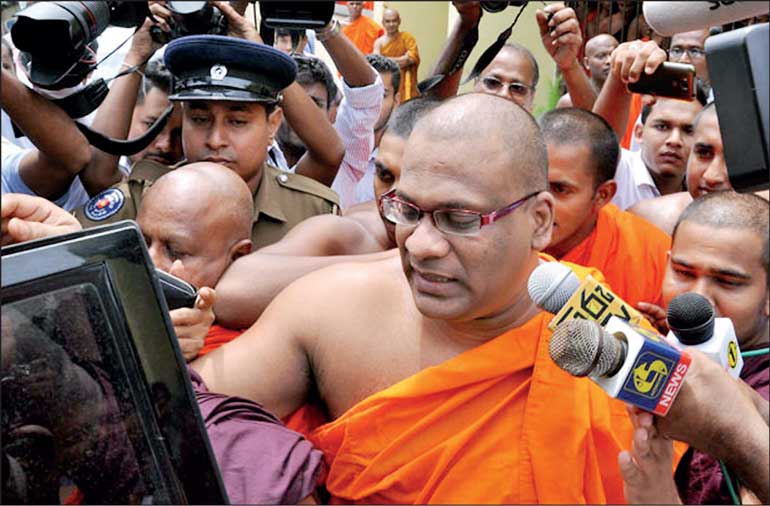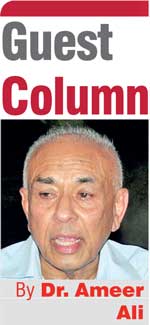Monday Feb 16, 2026
Monday Feb 16, 2026
Saturday, 3 August 2024 00:10 - - {{hitsCtrl.values.hits}}

Will Gnanasara provide a golden opportunity for RW to postpone or cancel the election by instigating widespread violence and declaration of emergency?
 Prisoner Galagoda Aththe Gnanasara Thera, a social miscreant and public provocateur in saffron robes, who was condemned by a Colombo High Court Magistrate to four years rigorous imprisonment with an additional fine of Rs. 100,000, had been released on bail after intense pressure from Buddhist prelates and the Sinhala Buddhist supremacist organisation Bodu Bala Sena (BBS) whose Secretary General happens to be this notorious prisoner. His release is the latest victory for political Buddhism, a deviant creed drawn up by a group of Buddhist monks, which in course of time became a vote winner in almost every election in Sri Lanka.
Prisoner Galagoda Aththe Gnanasara Thera, a social miscreant and public provocateur in saffron robes, who was condemned by a Colombo High Court Magistrate to four years rigorous imprisonment with an additional fine of Rs. 100,000, had been released on bail after intense pressure from Buddhist prelates and the Sinhala Buddhist supremacist organisation Bodu Bala Sena (BBS) whose Secretary General happens to be this notorious prisoner. His release is the latest victory for political Buddhism, a deviant creed drawn up by a group of Buddhist monks, which in course of time became a vote winner in almost every election in Sri Lanka.
Political Buddhism through its electoral influence has become a decisive factor in shaping the country’s mode of governance. Gotabaya Rajapaksa’s two-year presidency illustrated the inseparable nexus between political Buddhism and governance, and his appointment of controversial Gnanasara Thera as the Head of One Country One Law Task Force was a product of this nexus. It was this historic but pernicious nexus that eventually created today’s poly-crisis. Yet, there are quite a number of scholar monks in this country who keep away from this creed and warn political leaders of its destructive role in the development of this blessed island. Alas! They are crying in wilderness.
What specific pressures did the Mahanayakas bring upon the magistrates is not known. But having failed to win support to their cause from (a) the two Muslim plaintiffs who took Gnanasara to court and (b) the Muslim community’s so-called apex religious body, All Ceylon Jamiyathul Ulema (ACJU), and having also failed to secure Ranil Wickremesinghe’s presidential pardon, the possibility of the prelates directly pressurising individual members of the judiciary should not be discounted. If politicians could it why couldn’t Mahanayakas? Whether politicians or Mahanayakas, outside interference in judicial matters adds to the urgent need for reforms in governance, a need stressed even by the IMF.
Notoriety of Gnanasara
The notoriety of Gnanasara is closely linked to his vituperative anti-Muslim campaign after the civil war. It was his public speeches against Muslims in particular and minorities in general that had been the immediate cause for a number of violent episodes after 2009. For example, it was his speech in 2015 in Aluthgama which led to the Sinhala-Muslim riot there, which, shockingly, was overseen by the then Defence Secretary Gotabaya Rajapaksa who dared not intervene to stop it. And it was Gnanasara and few of his saffron colleagues in 2019 who desecrated the holy precinct of a Hindu temple in Mullaitivu by cremating the corpse of a Buddhist monk who died in Colombo. He ignored the court order to stop it and operated like a state sponsored outlaw.
A year before that in 2018 he contemptuously behaved inside the Magistrate Court in Homagama, disrupting the court proceedings and intimidating the magistrate for which he was sentenced to 19 years rigorous imprisonment. But on appeal to the Supreme Court that sentence was reduced to six years. However, when the former President Maithripala Sirisena decided to enter the Presidential race in 2019, he pardoned this social miscreant and got him released from prison so that Sirisena could capture the Buddhist vote bank. Finally, when two Muslim politicians went back to the court accusing Gnanasara for the insulting statement he made about Islam in 2016 a Buddhist magistrate sentenced him to four years rigorous imprisonment. Once again political Buddhism has intervened to get him released.
The three Mahanayakas who initiated the move had virtually made a mockery of the country’s justice system, which as pointed out earlier has lost much of its independence already. However, it is commendable and ethical for religious leaders to plead in public on behalf of innocents who are thrown into prison and tortured by the State on false charges, but it is totally unethical and demeaning for them and their institutions to plead on behalf of proven offenders who had become a nuisance to society. Gnanasara is one such nuisance. Where were the Mahanayakas for example, when Dr. Shafi was thrown into prison on false charges? Did they keep quiet because that prisoner happened to be a Muslim? Doesn’t Buddhist compassion extend to the entire humanity?
Carnival of coalitions
What is significant in this entire saga is that it all happened when the country is edging towards a presidential election and the date has been fixed for 21 September. The carnival of coalitions had begun in earnest. However, every coalition and their leaders, with the exception of NPP, know very well that without the backing of political Buddhism their chances of crossing the victory line would be hopeless. NPP is an exception, because it has already declared that it would change the political culture of this country through social revolution which implies distancing democratic governance from the theocratic crowd.
This does not mean that NPP is anti-religious as its opponents try to portray, but it is not prepared to honeymoon with political Buddhism. That was the spirit behind and message from the aragalaya as encapsulated in the demand for system change. The Aragalaya youth never entertained the presence of Buddhist priests in their protest gatherings. During one such gathering in Borella for example, when a bhikkhu tried to participate, aragalayists respectfully appealed to him to leave that place.
After his bail out, Gnanasara has not stopped his provocative utterances and behaves like a wounded elephant set to run riot. As election approaches, he and his BBS are available for hire at the right price. Gnanasara’s open accusation that those who were responsible for the 2019 Easter infamy are hiding behind political leaders should send jitters among those leaders who would wish to win him over to their side. Let Muslims in particular and minorities in general be warned of possible communal flareups as election approaches.
Too often in the past, security forces had remained onlookers when such violence against minorities broke out. Will Gnanasara provide a golden opportunity for RW to postpone or cancel the election by instigating widespread violence and declaration of emergency? Nothing should be discounted in Sri Lankan politics.
(The writer is attached to Business School, Murdoch University, W. Australia.)